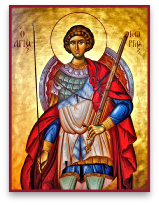
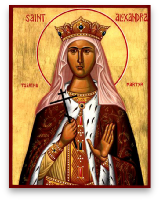



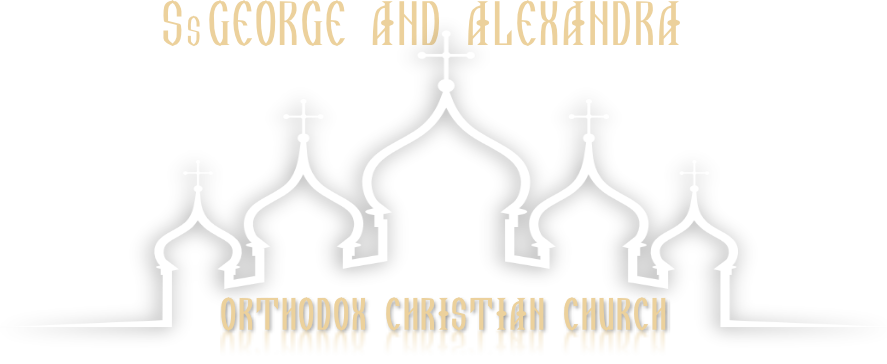


St. George and Alexandra Holy Orthodox Church
7500 Mahogany Ave
Fort Smith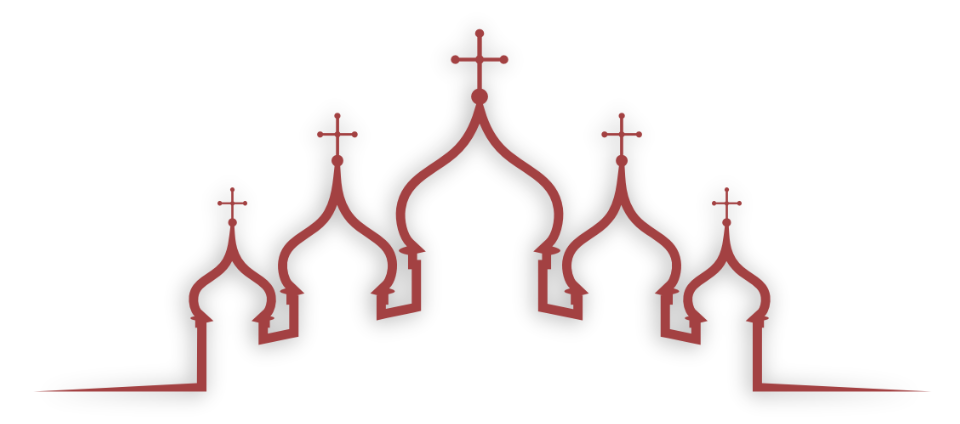 AR 72916
AR 72916
479-883-4771

Greatmartyr, Victory-bearer and Wonderworker George
Commemorated on April 23
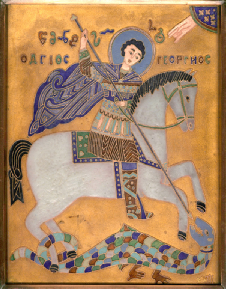 The Holy Great Martyr George the Victory-Bearer, was a native of Cappadocia (a district in Asia Minor), and he grew up in a deeply believing Christian family. His father was martyred for Christ when George was still a child. His mother, owning lands in Palestine, moved there with her son and raised him in strict piety.
The Holy Great Martyr George the Victory-Bearer, was a native of Cappadocia (a district in Asia Minor), and he grew up in a deeply believing Christian family. His father was martyred for Christ when George was still a child. His mother, owning lands in Palestine, moved there with her son and raised him in strict piety.
When he became a man, Saint George entered into the service of the Roman army. He was handsome, brave and valiant in battle, and he came to the notice of the emperor Diocletian (284-305) and joined the imperial guard with the rank of comites, or military commander.
The pagan emperor, who did much for the restoration of Roman might, was clearly concerned with the danger presented to pagan civilization by the triumph of the Crucified Savior, and intensified his persecution against the Christians in the final years of his reign. Following the advice of the Senate at Nicomedia, Diocletian gave all his governors full freedom in their court proceedings against Christians, and he promised them his full support.
Read More!!!
Martyr Alexandra the Empress, wife of Diocletian
Commemorated on April 23
 The Holy Empress Alexandra was the wife of Diocletian (284-305). Her supposed death was described in the Martyrdom of Saint George, which was written immediately after his death. The empress, however, received the crown of martyrdom several years later, in 314.
The Holy Empress Alexandra was the wife of Diocletian (284-305). Her supposed death was described in the Martyrdom of Saint George, which was written immediately after his death. The empress, however, received the crown of martyrdom several years later, in 314.
Many events occurred during these years. In 305 the emperor Diocletian resigned the throne and power passed to his co-ruler Maximian Galerius (305-311), a fanatic pagan, as well as a coarse and fierce soldier. His wife was Saint Valeria, the daughter of the holy Empress Alexandra, whom Diocletian had given in marriage against her will.
Saint Alexandra raised her daughter in Christian piety. When Galerius died, the emperor Maximinus sought her hand in marriage. When he was refused, he banished Saint Valeria to Syria, where she lived with her mother.
After the death of Maximinus in 311 the mother and daughter arrived in Nicomedia, trusting in the mercy of the emperor Licinius (311-324). Together with Saint Constantine, he had subscribed to the Edict of Milan, which gave Christians the freedom of religion, but secretly he remained an enemy of Christianity. Licinius gave orders to execute the holy Empress Alexandra and her daughter Valeria. They were beheaded, and their bodies thrown into the sea.










 Read More!!!
Read More!!!

